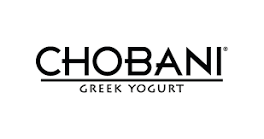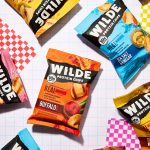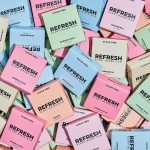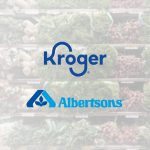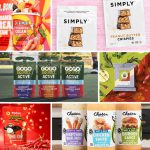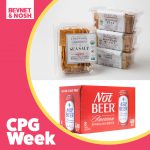UNSTUCK Debuts With Chobani Partnership, Creating Jobs For Refugees
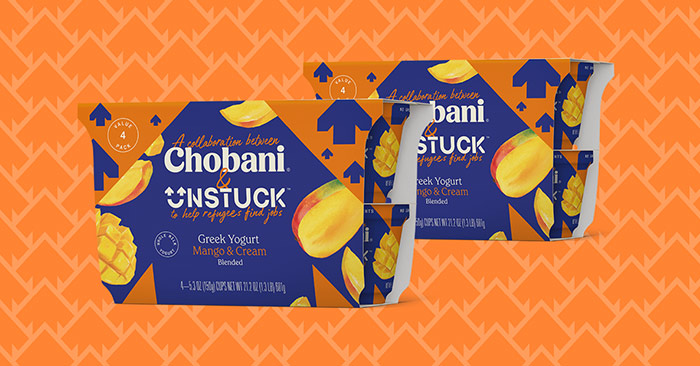
Leveraging supply chains, UNSTUCK is on a mission to support refugees. An extension of nonprofit The Tent Partnership for Refugees, the initiative has developed brand partnerships which it believes can create sustainable change, and it’s demonstrating this power through a new launch with yogurt brand Chobani.
Founded in 2016 by Chobani chairman and CEO Hamdi Ulukaya, The Tent Partnership for Refugees has grown into a global business network of over 170 companies that are committed to mentoring and assisting refugees in various ways to find employment opportunities. Still, the organization felt there was more that could be done.
While Tent is a resource for refugees, offering mentorship and networking opportunities intended to help displaced people find jobs, UNSTUCK helps create employment opportunities. By partnering with companies to develop and create tangible products, the organization then works with ingredient suppliers in exchange for a commitment to hire a certain number of refugees each year. Nick O’Flaherty, the director of UNSTUCK, said the deeper partnerships mean the products are not only a “one-off thing,” like a traditional profit-percentage donation model, and instead will generate systemic change across a variety of industries.
“We are using the power of the market to create change,” O’Flaherty said. “The more brands we bring on board, the more products are created, the more ingredients are sourced and the more jobs we can secure for these refugees.”
Currently, the initiative is focused on helping Venezuelan refugees in both Columbia and Peru. Through the help of local NGOs, UNSTUCK identifies workers with the correct skill sets and then facilitates the onboarding process with suppliers such as CUSO in Colombia and HIAS in Peru. According to O’Flaherty, as long as refugees have the right to work in the host country, the hiring process isn’t much different, simply requiring “a little more paperwork.” He said the largest barrier to refugee employment is not government regulations, but rather refugees’ lack of resources and relationships to find jobs within their new host country.
As there is a degree of separation between UNSTUCK and the refugees they help, O’Flaherty said there are safeguards in order to ensure workers are protected. According to O’Flaherty, in order to ensure the employees are receiving fair treatment and working conditions, UNSTUCK only works with Supplier Ethical Data Exchange (SEDEX) certified ingredient suppliers. This means that the supplier has been thoroughly vetted for fair labor practices by SEDEX’s methodology and that they comply with minimum wage and minimum legal benefits in accordance with local laws.
“Number one is making sure these are good places to work, that these suppliers are amazing employers for all of their employees,” said O’Flaherty. “The other part is making sure there is auditing going on through existing processes that our brand partners have. This ensures that our suppliers on the ground have their specific needs catered to, they are hitting their goals both in terms of the numbers of refugees they are employing and the quality of the work.”
In addition to assisting the refugees through the hiring process, UNSTUCK is also involved with the creation of its products – assisting brands with everything from product development to finding suppliers to source ingredients.
To start, the program has kicked off with a collaboration between UNSTUCK and Chobani’s product development and procurement teams to launch a Mango and Cream Greek Yogurt. After analyzing products already in development, the Chobani team was able to find ingredient suppliers that fit the needs of the brand and would be able to work with UNSTUCK’s new program. Currently available at select retailers nationwide, the yogurt’s front of pack not only highlights UNSTUCK but also mentions it helps refugees find jobs.
At the moment, UNSTUCK is in pilot mode, focused on the single product, but O’Flaherty said they are looking to expand the program within food, beverage and apparel categories. Given its existing relationships, UNSTUCK is specifically seeking partnerships with brands that utilize fruit as a core ingredient, such as baby food and fruit juice. The program hopes to facilitate a broader consumer-facing launch in January 2022 with the announcement of a “whole quandary” of brand partnerships and an array of UNSTUCK products, said O’Flaherty.
“Now that we have this tangible product and a process we can point to, we are hoping to get more brands on board,” said O’Flaherty. “We have a concept that has been in the works for a while and now we have a proof of concept. It has moved from a slide to a delicious yogurt that people can actually try, see and support.”
Down the line, UNSTUCK hopes to expand the program’s reach to the vulnerable refugee populations in the Middle East and East Africa. O’Flaherty said he believes this model has the potential to become a core aspect of the way brands do business, especially considering younger consumers’ preference for companies that not only take a stand on an issue, but also take action.
”This isn’t going to be a disruption to what [brands already] do,” said O’Flaherty. “It’s just looking into different sourcing opportunities, looking at suppliers that are committed to hiring different refugees and working together to really support the most vulnerable populations in societies around the world. It’s all about helping more people become unstuck and finding those brand partners will help us scale that impact and change lives.”

